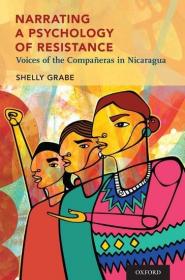
现货Narrating a Psychology of Resistance: Voices of the Compa?eras in Nicaragua[9780190614256]
¥ 647 九五品
仅1件
作者Grabe, Shelly
出版社Oxford University Press, USA
ISBN9780190614256
出版时间2016-12
装帧精装
纸张其他
页数288页
正文语种英语
上书时间2023-08-09
- 最新上架
商品详情
- 品相描述:九五品
- 商品描述
- The Movimiento Autónomo de Mujeres (Women''s Autonomous Movement) in Nicaragua - birthed in part from the Sandinista Revolution of the 1980s - represents one of the largest, most diverse, and most autonomous women''s movements in all of Latin America.While it''s true that scholars across a wide range of disciplines have written invariably about this social movement (and have been instrumental in arguing that these women are not mere victims, but individuals who have worked hard to resist oppression and fight injustice for decades) what remains missing from this body of work is scholarship aimed at understanding, specifically, the psychology of resistance; in other words, what are the psychological mechanisms and methodologies that emerge from the margins that determine the kind of social action that revolutionizes societies?Investigating the psychosocial processes behind resistance is critical to understanding a commitment to justice and the development of subjectivity necessary for enacting the political activity required for social transformation. Psychology, in particular, as author Shelly Grabe argues, is positioned to engage in a systematic exploration of the links between social and political conditions that determine how, why, and under what circumstances resistance emerges. Narrating a Psychology of Resistance documents the first-hand accounts of the Nicaraguan women''s Movimiento: a coordinated mobilization of women that has weathered unremitting power differentials characterized by patriarchy and capitalism. In this collection of testimonios, Grabe gives voice to these extraordinary women and closely examines how psychological processes that emerge in response to sociopolitical oppression can lead to gendered justice and the revolutionizing of societies at large.
相关推荐
-
![现货Narrating and Constructing the Beach: An Interdisciplinary Approach[9783110671377]](https://www0.kfzimg.com/sw/kfz-cos/kfzimg/17733071/f8dc25a2e78e6628_s.jpg)
现货Narrating and Constructing the Beach: An Interdisciplinary Approach[9783110671377]
九五品上海
¥ 854.00
-
![现货Narrating Law and Laws of Narration in Medieval Scandinavia[9783110654219]](https://www0.kfzimg.com/sw/kfz-cos/kfzimg/17733071/2f1a79dbab72c7a7_s.jpg)
现货Narrating Law and Laws of Narration in Medieval Scandinavia[9783110654219]
九五品上海
¥ 979.00
-
![现货Reading Voices; Five Studies in Theocritus' Narrating Techniques (Lang Classical Studies)[9781433132490]](https://www0.kfzimg.com/sw/kfz-cos/kfzimg/17733071/2baa760c66a99c13_s.jpg)
现货Reading Voices; Five Studies in Theocritus' Narrating Techniques (Lang Classical Studies)[9781433132490]
九五品上海
¥ 618.00
-

PS, I Love You: A Novel
九品衡水
¥ 20.00
-

PS I Love You: A Novel
九品衡水
¥ 28.00
-

PS a building by Eric Owen Moss
八五品太原
¥ 300.00
-

现货:《@PS8系列总体简介》
八五品厦门
¥ 36.99
-

National NV-E180ps-A
八五品无锡
¥ 25.50
-

Blo,HAzARD(2)光碟(A,B,)ps两盘。
九品大庆
¥ 20.00
-

PS2游戏光盘 光枪游戏合集A
八五品
¥ 30.00
— 没有更多了 —
![现货Narrating a Psychology of Resistance: Voices of the Compa?eras in Nicaragua[9780190614256]](https://www0.kfzimg.com/sw/kfz-cos/kfzimg/17733071/4037712149edb5ce_b.jpg)

![现货Materials and Technologies of Modern Production[9783036401683]](https://www0.kfzimg.com/sw/kfz-cos/kfzimg/17733071/5fd2824531e165d7_s.jpg)
![现货Introduction to Container Ship Operations and Onboard Safety[9781032155425]](https://www0.kfzimg.com/sw/kfz-cos/kfzimg/17733071/58b7ff43ef7909ee_s.jpg)
![现货Electrophosphorescent Materials and Devices[9789814877343]](https://www0.kfzimg.com/sw/kfz-cos/kfzimg/17733071/18cc1d77bcb7b488_s.jpg)
![现货Organic Semiconductors for Optoelectronics[9781119146100]](https://www0.kfzimg.com/sw/kfz-cos/kfzimg/17733071/24c85a750c708964_s.jpg)
![现货Advances in Food Rheology and Its Applications[9780081004319]](https://www0.kfzimg.com/sw/kfz-cos/kfzimg/17733071/e0c11603c9119d4d_s.jpg)
![现货Advanced Materials and Sustainable Technologies[9783035727562]](https://www0.kfzimg.com/sw/kfz-cos/kfzimg/17733071/dced675333874c48_s.jpg)
![现货Advanced Materials and Manufacturing Engineering II[9783035712681]](https://www0.kfzimg.com/sw/kfz-cos/kfzimg/17733071/660ccfae75fa8d3e_s.jpg)
![现货Materials in Machinery and Construction[9783035718119]](https://www0.kfzimg.com/sw/kfz-cos/kfzimg/17733071/6f402060775e9daa_s.jpg)
![现货Cereal Grain Quality (Softcover Reprint of the Original 1st 1996)[9789401071772]](https://www0.kfzimg.com/sw/kfz-cos/kfzimg/17733071/f93ca1c96a97403a_s.jpg)
![现货Narrating a Psychology of Resistance: Voices of the Compa?eras in Nicaragua[9780190614256]](/dist/img/error.jpg)
以下为对购买帮助不大的评价